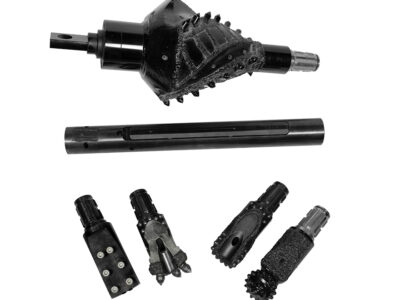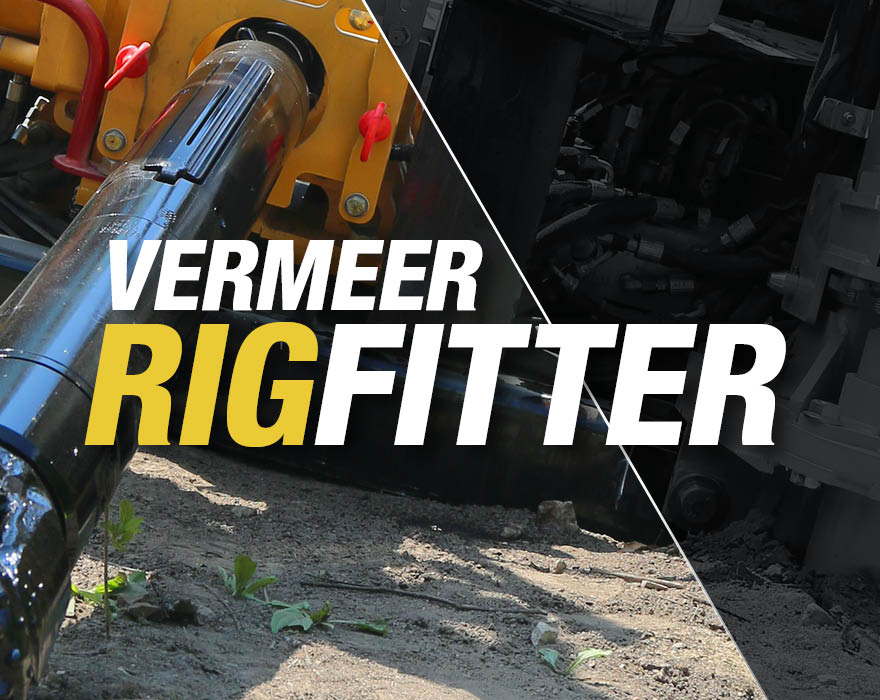With fiber installation jobs, success is often measured in feet (meters).
“In many cases, if you are not getting 1,000 ft (304.8 m) per day out of a particular horizontal directional drill (HDD) crew, you are not maximizing your productivity,” said Vermeer Cutting Edge Product Manager Cody Mecham.
Time on an HDD fiber installation crew can be measured in minutes per rod. Getting the most product installed during a shift starts with choosing the correct HDD tooling. Vermeer offers the proper tooling to handle the unique conditions you work in.
Select drill bits to match ground conditions
There can be a tendency to use the HDD tooling you were trained on. However, using the same tooling for every job isn’t always the best choice. There may be opportunities to decrease the minutes per rod and wear on the drill bit with other tooling options. However, the metrics that drive the drill bit selection process can be subjective.
“Good starting points are the ground conditions and what other HDD contractors in the area are using,” noted Mecham.
You should also watch for obvious signs that the wrong drill bit is being used.
“If you are burning a plate bit up in a couple of weeks to a month, it is probably not the right choice for your ground conditions,” said Mecham. “You need something more durable.”
Tooling with increased durability often has a higher purchase price. These factors need to be weighed against each other. According to Mecham, it may be more economical to purchase the right platform up front — rather than going through a higher quantity of less durable tooling.
Time not spent in the hole represents lost opportunity
“It’s not necessarily the productivity in the hole that creates the issue. It is the time lost if you have to trip out prematurely for a worn-out bit or you are taking the time to swap bits out between shots,” said Vermeer Cutting Edge Product Sales Manager Chris Fontana.
Vermeer helps address this issue with a complete line of Ace™ steep taper drill bits available in Standard, Pro, Pro Extreme and Premium offerings that fit the unique needs of various ground conditions. The plug-style tooth design of the Ace bit allows teeth to be positioned closer to each other to help maximize carbide coverage for extended wear life.
The Standard Ace™ bit features a rounded bit face to assist steering performance. This HDD tooling is designed for softer ground conditions that are more abrasive, medium-packed soils and light gravel.
The Pro Ace™ steep taper bits are a step up from the Standard Ace bits. They feature a semi-aggressive tapered front design for penetration in harder ground conditions — from loam to moderately aggressive cobble, sand and hardpan.
The Pro Ace™ Extreme bits share the same profile of the Pro Ace™ bits, but they balance steerability and penetration. They feature carbide teeth along the full edge of the bit to extend wear life in cobble, hard pan and light rock.
The Premium Ace™ steep taper bit features an aggressive tapered bit front to help penetration rates in aggressive ground conditions such as heavy cemented cobble, hard-packed soils and softer shale.
“The decision ultimately comes down to what you can achieve,” said Mecham. “If you are not getting the life or the productivity out of the drill bits, then you creep up that food chain to get to a more premium product, such as the Pro Ace or Premium Ace bits.”
Premium offerings boost digging performance
Key design features help to differentiate the premium products within the Vermeer HDD tooling line.
“The Vermeer Premium housing has dual angled water ports which allow drilling fluid to get toward the front of the bit,” said Mecham. “This cleans the teeth. If you are drilling for volume, keeping the teeth cleaner is going to maximize performance. Traditional-style dirt housings feature jets that hit the back side of the plate instead of cleaning the teeth.”
In addition to the Vermeer Premium housing line, Vermeer also offers the Armor and Ultra X3 drilling systems to target the most demanding applications. The Ultra X3 is set up to use a full offering of plate bits and rock tooling like the Vermeer Gauntlet, Lance, Trident and roller cone bits.
“The Ultra X3 is a premium product and can help increase your operation’s productivity,” noted Fontana.
Since the Vermeer Ultra X3 uses a robust spline connection system, the HDD tooling doesn’t have to be threaded on, eliminating the need for breakout tongs to make and break torqued tooling connections. Operators just need to align the spline on the tooling with the spline on the housing, then secure by tapping in dowel pins. The system can handle the torque of reaming directly from the transmitter housing at diameters up to 10 in (25 cm) in most ground conditions.
Pullback considerations
Pullback is one of the most important considerations when planning a fiber optic cable installation.
“Many HDD crews installing fiber are pulling directly by adding a puller to their plate bit,” said Mecham. “Some of them are having to slightly open the hole too. It depends on what that job looks like, whether it is fiber to the home, which is really small in diameter, or whether you are pulling a couple of conduits back.”
Often the pulling eye is fastened to the bit along with a swivel that enables rotation.
“The benefit of rotating is that you clean the hole up. You can compress the hole out to a bigger diameter or clean up what cutting might have been left in the hole,” explained Mecham.
The decision on whether to pull back with the bit or remove the bit is based on the diameter and how much annular space is in the hole.
“Our new pull back tab allows us to pull right off your bit versus removing that bit,” said Mecham.
In applications where there is cobble or sand, it is advised to use a reamer for hole integrity.
“Even if the hole is there and there is one cobble down in the hole, that can be problematic,” said Mecham. “It can potentially damage the product. One that is less of an absolute in my mind is sand. It is good insurance to pull back a reamer and make sure you can pull that product. In case that hole is lost somewhere along that patch, that reamer is going to open it up, hopefully enough that you can sneak that product past it.”
The Ultra X3 system simplifies the reaming process. The reamer can be directly attached to the housing, saving time and reducing the required space for setup.
Similar to bits, Vermeer offers a complete line of reamers, including fluted reamers for ground conditions ranging from hard pan to soft rock; the T-REX reamer for cobble, chunk rock and soft rock; Mix Master™ reamers for reactive ground conditions; and the Supreamer for aggressive cutting action and ease of pushback.
All the available options for bits, housings and reamers make it possible to optimize your HDD operations for fiber optic cable installation. Vermeer even provides a tool that helps simplify the process of selecting HDD tooling with the Vermeer RigFitter HDD tooling configurator. Simply indicate which Vermeer HDD model you are using, and the digital tool will then provide step-by-step recommendations for compatible tooling, including adapters, transmitter housings and bits or reamers, depending on whether you select pilot or pullback configuration.
To help identify the best tooling for your fiber optic installations, work with the HDD tooling specialist at your local Vermeer dealer.
Vermeer Corporation reserves the right to make changes in product engineering, design and specifications; add improvements; or discontinue manufacturing or distribution at any time without notice or obligation. Equipment shown is for illustrative purposes only and may display optional accessories or components specific to their global region. Please contact your local Vermeer dealer for more information on machine specifications.
Vermeer, the Vermeer logo, Ace and Mix Master are trademarks of Vermeer Manufacturing Company in the U.S. and/or other countries. © 2023 Vermeer Corporation. All Rights Reserved.

